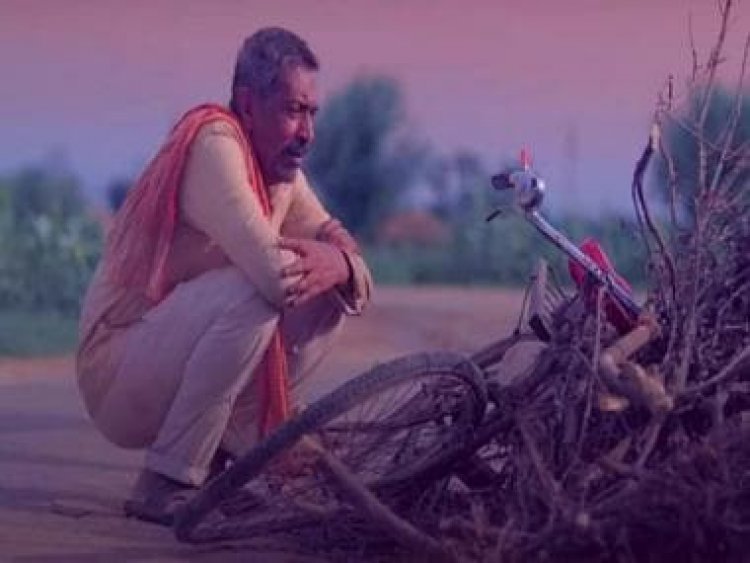Matto Ki Saikil: The India that we hardly get to see in our cinema
Matto Ki Saikil: The India that we hardly get to see in our cinema

While addressing itself to the lowest strata of our social system where an individual accepts his or her life to be a wretched anomaly, debutant director M Ghani’s Matto Ki Saikil is ironically very ambitious: it recalls the vivid neo-realism of Satyajit Ray’s Pather Panchali and Bimal Roy’s Do Bigha Zamin.
In its simplicity and charm and its deep connectivity with the grassroots, Prakash Jha’s production of Matto Ki Saikil takes us back to the days of Pure Cinema when movies informed and entertained. It’s directed by a complete newcomer M Gani, a talented directorial discovery from Mathura who had no experience in movie making before this.
Gani is a talent to watch. He insisted on casting Prakash Jha in the lead role, not because Jha is the producer but because he seems the perfect fit to play Matto, the Dalit daily wage earner who somehow manages to eke out a living for his family of wife and two daughters and for whom a buying a new bicycle is not just a distant dream but a living nightmare.
Like Vittorio de Sica’s imperishable 1948 classic Bicycle Thieves, the bicycle in Matto Ki Saikil is the fulcrum of Matto and his family’s existence. Take away the rickety contraption, and Matto is as bereft as Balraj Sahni’s Shambhu Mahato without his rickshaw in Do Bigha Zamin.
We hardly notice the invisible India, the eighty percent who live and die below the poverty line, pathologically attached to their thela(cart) and bicycles. To us from outside these contraptions are junk. To them, it’s their lifeline.
The bicycle in fact is a running(or shall we say, limping) leitmotif in this bright study of abject poverty where misery is a state of mind you don’t entertain: you simply accept that being the scavenger in destiny’s hierarchy is what you get in life, and move on from there.
I have to admit Prakash Jha’s performance surprised me. He is every inch the grassroot-level Matto almost unhealthy in his attachment to his ramshackle bicycle which he sees as his only transportation to daily sustenance for his wife and two daughters.
Interestingly, Jha belongs to the ‘other’ side. He is a Brahmin landlord in real life, and hence the traditional exploiter of the Mattos of our world. Jha’s best directorial undertakings Damul and Mrityudand are about caste exploitation. In Matto Ki Saikil he moves to other the side, both as a citizen from the upper-caste and as a cineaste from behind to the front of the camera. The end result is a gentle elegant fable-like neo-realistic drama on eking out a living in a social structure creaking under the weight of exploitation.
Matto Ki Saikil reminded me very strongly of the late cinematographer Rajen Kothari’s directorial Das Kapital Ghulamon Ki Rajdhani. Based on the writing of the well-known Hindi writer Shaiwal, it takes us directly into a government office in a remote town of Bihar where corruption is not only a way of life but also the only means of survival. Without glorifying bribery, commissions and other under-the-table practises this credible drama of human degeneration plunges us into cesspool of wretched lives, some of whom like the sexually exploited wife (Ayesha Raza) are recognizable figures from the writer Shaiwal’s fictional themes. Barring the hero Purushottam Ram, an underprivileged man with mounting financial liabilities, every government staffer is shown to have accepted grafts and bribe as a way of life.
This is a godforsaken, wretched town were eking out a living is an ongoing struggle for the poor, staying uncorrupted is an impossibility and falling sick is a luxury that the characters can ill-afford. Shot on location in Bihar, with cinematography not by Rajen Kothari himself but by Chandan Goswami, Das Kapital is a stark and unadorned look at irredeemable characters trapped in a societal lockdown.
As I compared the two films I wondered what Matto in Matto Ki Saikil would make of Purroshottam Ram in Das Kapil Ghulamon Ki Rajdhani. When they compare notes they will wonder who is the survivor of the two. For all outward purposes, both are dead souls, with no signs of their misery getting a decent burial. RIP, real India.
Subhash K Jha is a Patna-based film critic who has been writing about Bollywood for long enough to know the industry inside out. He tweets at @SubhashK_Jha.
Read all the Latest News, Trending News, Cricket News, Bollywood News, India News and Entertainment News here. Follow us on Facebook, Twitter and Instagram.
What's Your Reaction?

























































